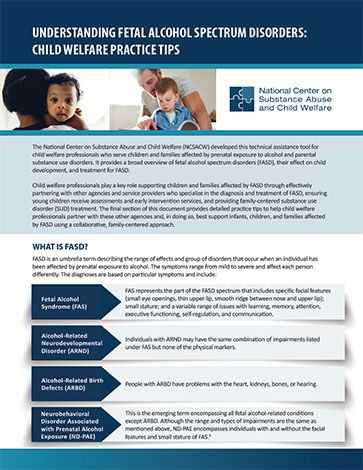Childhood and Adolescence
Services for children and adolescents must meet their unique health, developmental, and social-emotional needs. Use these resources to gain insight about the needs of youth involved in child welfare and affected by substance use.
Highlighted Resource
Understanding Fetal Alcohol Spectrum Disorders: Child Welfare Practice Tips

National Center on Substance Abuse and Child Welfare, 2022
Provides an overview of fetal alcohol spectrum disorder (FASD); the effect of FASD on child development; FASD treatment; and child welfare
...(Read More)Policy and Practice Resources
Understanding Fetal Alcohol Spectrum Disorders: Child Welfare Practice Tips
National Center on Substance Abuse and Child..., 2022
Provides an overview of fetal alcohol spectrum disorder (FASD); the effect of FASD on
... (Read More)Understanding Fetal Alcohol Spectrum Disorders for Substance Use Treatment Professionals
National Center on Substance Abuse and Child..., 2022
Designed for substance use treatment professionals who serve: 1) parents with alcohol
... (Read More)Screening and Treatment of Substance Use Disorders Among Adolescents
Substance Abuse and Mental Health Services A..., 2021
Summarizes key messages and considerations for screening and treating adolescents
... (Read More)Preventing, Identifying, and Treating Substance Use Among Youth in Foster Care
Child Welfare Information Gateway, 2020
Provides child welfare professionals with information about the extent and effects of
... (Read More)Cultural Connectedness and Indigenous Youth Well-Being
National Indian Child Welfare Association, 2019
Explores the concept of “cultural connectedness” and its importance for: 1) positive
... (Read More)How Adolescent Brain Science Supports Youth Engagement in Court Hearings and Case Planning
American Bar Association, 2019
Part of the Adolescent Brain Research Toolkit . Provides a basic framework of
... (Read More)Promoting Permanency for Older Youth in Out-of-Home Care
Child Welfare Information Gateway, 2019
Provides child welfare professionals with information on the importance of permanency
... (Read More)Treatment Improvement Protocol (TIP) 31: Screening and Assessing Adolescents for Substance Use Disorders
Substance Abuse and Mental Health Services A..., 2012
Provides general guidelines for evaluating, developing, and administering screening
... (Read More)Additional Resources
National and State Estimates of Children Living with Parents Using Substances, 2015-2019
U.S. Department of Health and Human Services..., 2022
Estimates of the number of children whose parents engage in problematic substance use
... (Read More)Talk. They Hear You: Substance Use Prevention
Substance Abuse and Mental Health Services A..., 2021
Provides tools to help parents and caregivers discuss the dangers of substances and
... (Read More)Substance Misuse Prevention for Young Adults: Evidence-Based Resource Guide Series
Substance Abuse and Mental Health Services A..., 2019
This guide helps health care providers, systems, and communities prevent substance
... (Read More)Intervention IDEAs for Infants, Toddlers, Children, and Youth Impacted by Opioids
U.S. Department of Education, Office of Spec..., 2018
Geared for parents, schools, and programs. Examines risk factors and symptoms
... (Read More)